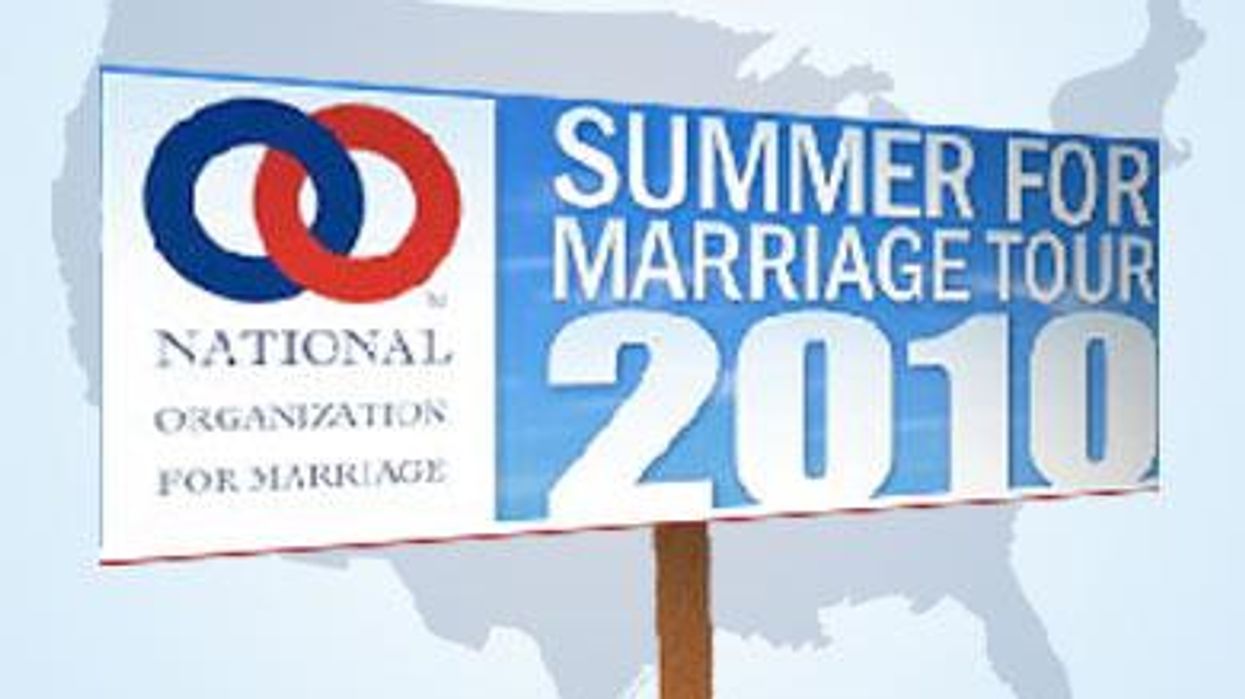CONTACTAbout UsCAREER OPPORTUNITIESADVERTISE WITH USPRIVACY POLICYPRIVACY PREFERENCESTERMS OF USELEGAL NOTICE
© 2025 Equal Entertainment LLC.
All Rights reserved
All Rights reserved
By continuing to use our site, you agree to our Privacy Policy and Terms of Use.
We need your help
Your support makes The Advocate's original LGBTQ+ reporting possible. Become a member today to help us continue this work.
Your support makes The Advocate's original LGBTQ+ reporting possible. Become a member today to help us continue this work.
COMMENTARY: This summer's news has focused on two hot issues: new concerns about a double-dip recession and Judge Vaughn Walker's decision overturning California's Proposition 8. In a jarring display of confused facts and logic, the National Organization for Marriage's antigay tour has brought those two issues together.
On the recent Iowa stop of the NOM tour, Concerned Women for America spokesperson Tamara Scott laid the blame for the social cost of "fragmented families" at the feet of allegedly unstable gay couples raising children. "It costs you, the taxpayer, as high as $280 billion a year for fragmented families," she warned the (small) group at the rally. Her argument suggested that one way to help the struggling economy would be to stop the formation of the fragmented gay families that are doing harm to themselves, their children, and U.S. taxpayers by their mere existence. In essence, she's arguing that stopping gay marriage in Iowa could help the economy.
That logic turns the actual relationship between marriage equality and the economy upside down. For one thing, many gay couples want the right to marry because they see marriage as a way to enhance their commitment to each other. So having the right to marry would actually increase the likelihood that same-sex couples would stay together (with or without kids), just as marriage does for different-sex couples. If stability saves taxpayers money, then taxpayers should favor marriage equality.
More to the point, giving gay couples the right to marry would have a direct positive effect on the economy in many ways. More than 20 studies of marriage equality's impact on state and federal budgets have unanimously concluded that those budgets would see a boost. The Congressional Budget Office, budget analysts in New York, Connecticut, and Vermont, as well as studies by the Williams Institute, all agree that marriage equality would save states money--which most states desperately need in this economy.
Businesses would also gain from the weddings of same-sex couples. Our research finds that gay and lesbian couples spend thousands of dollars on their weddings, and those celebrations draw people from out-of-state to spend even more. We estimate that Massachusetts businesses got a boost of more than $100 million in the first few years of gay couples' weddings. Most of the beneficiaries are small businesses that are really feeling the economic pinch, including photographers, wedding planners, caterers, bakeries, and hotels. Gay marriage is helping to keep those businesses afloat in Iowa, Washington, D.C.; and New England.
In contrast to the twisted logic presented by NOM, Judge Vaughn Walker's decision overturning Prop. 8 provides an excellent model for bringing facts into the debate about giving same-sex couples the right to marry. That trial demonstrated the economic harms of Prop 8 to gay couples and to state and local governments. Prop 8 cost California businesses hundreds of millions of dollars. Those who care about taxpayers and the health of families will find marriage equality supports both of those goals.
M. V. Lee Badgett is the Research Director of the Williams Institute at UCLA. She is also a professor of economics at the University of Massachusetts, Amherst.This article is the opinion of the writer and not The Advocate.
From our Sponsors
Most Popular
Bizarre Epstein files reference to Trump, Putin, and oral sex with ‘Bubba’ draws scrutiny in Congress
November 14 2025 4:08 PM
True
Jeffrey Epstein’s brother says the ‘Bubba’ mentioned in Trump oral sex email is not Bill Clinton
November 16 2025 9:15 AM
True
Watch Now: Pride Today
Latest Stories
Texas expands lawsuits against doctors accused of providing gender-affirming care to youth
December 11 2025 4:36 PM
How Sundance 2026 celebrates its queer legacy
December 11 2025 3:54 PM
George Santos’s exclusive D.C. Christmas party featured famous grifters & MAGA influence peddlers
December 11 2025 3:31 PM
Nancy Mace investigated for bad behavior at airport, blames transgender people
December 11 2025 1:11 PM
Pete Buttigieg mocks Trump Transportation Secretary Sean Duffy’s strange airport pull-up stunt
December 11 2025 1:00 PM
Appeals court mulls upholding ruling that struck down Pentagon’s HIV enlistment ban
December 11 2025 11:51 AM
Florida sues leading medical groups for supporting gender-affirming care
December 11 2025 11:02 AM
Behind Marjorie Taylor Greene's latest push to criminalize gender-affirming care
December 10 2025 9:09 PM
Queer actor Wenne Alton Davis, known for 'Maisel,' 'Normal Heart,' killed in NYC car crash
December 10 2025 5:14 PM
‘Proud’ pro-LGBTQ+ Democrat flips Republican state House seat in Georgia electoral upset
December 10 2025 4:05 PM
Texas city votes to overturn LGBTQ+ antidiscrimination protections
December 10 2025 4:03 PM
Pornhub's spicy stats prove just how horny 2025 was
December 10 2025 3:30 PM
'Heated Rivalry' stars thank WeHo gay bar for 'tweeting about our butts'
December 10 2025 2:55 PM
Egypt and Iran tell FIFA to cancel World Cup Pride Match, calling it 'contrary' to values
December 10 2025 1:05 PM




































































Charlie Kirk DID say stoning gay people was the 'perfect law' — and these other heinous quotes